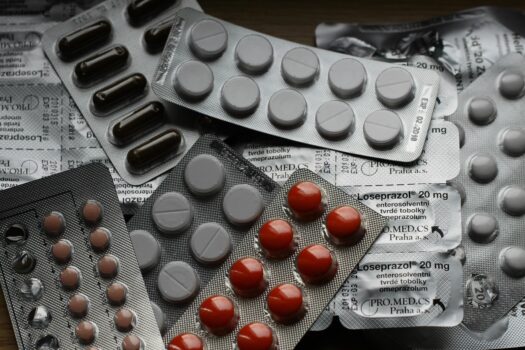10 Medications You Should Never Mix with Alcohol – and Why
10 Medications You Should Never Mix with Alcohol – and Why. In today’s fast-paced world, it’s common to turn to medications for various health concerns. However, many people overlook the potential dangers of mixing these medications with alcohol. While it may seem harmless or even beneficial to have a drink while taking medication, the truth is that combining certain drugs with alcohol can have serious consequences. In this article, we’ll explore ten medications you should never mix with alcohol, and delve into why this combination can be so risky.
Table of Contents
| Sr# | Headings |
|---|---|
| 1 | Introduction |
| 2 | Why Mixing Medications and Alcohol is Risky |
| 3 | Medications You Should Avoid Mixing |
| 4 | 1. Pain Medications |
| 5 | 2. Antidepressants |
| 6 | 3. Antibiotics |
| 7 | 4. Sleep Aids |
| 8 | 5. Blood Pressure Medications |
| 9 | 6. Diabetes Medications |
| 10 | 7. ADHD Medications |
| 11 | 8. Antihistamines |
| 12 | 9. Muscle Relaxants |
| 13 | 10. Opioid Painkillers |
| 14 | Conclusion |
| 15 | FAQs |
Introduction
When it comes to our health, it’s essential to be aware of how different substances interact with each other. One such combination that can have serious consequences is mixing medications with alcohol. While it might seem harmless at first glance, the reality is that this combination can lead to various health risks and complications.
Why Mixing Medications and Alcohol is Risky
Alcohol is a central nervous system depressant, meaning it slows down brain function and impairs motor skills and judgment. When combined with certain medications, the effects can be amplified or altered, leading to dangerous outcomes. Additionally, alcohol can interfere with the absorption, metabolism, and effectiveness of many medications, making them less potent or even toxic.

Medications You Should Avoid Mixing
1. Pain Medications
Key Points: Pain medications like opioids can cause severe respiratory depression when combined with alcohol, leading to difficulty breathing or even overdose.
2. Antidepressants
Key Points: Mixing antidepressants with alcohol can worsen depression symptoms, increase drowsiness, and heighten the risk of suicidal thoughts or actions.
3. Antibiotics
Key Points: Alcohol can reduce the effectiveness of antibiotics and may cause side effects like nausea, vomiting, and dizziness when combined with certain antibiotics.
4. Sleep Aids
Key Points: Combining sleep aids with alcohol can result in excessive drowsiness, dizziness, and impaired coordination, increasing the risk of accidents and falls.
5. Blood Pressure Medications
Key Points: Alcohol can interact with blood pressure medications, leading to increased heart rate, dizziness, fainting, and other cardiovascular complications.
6. Diabetes Medications
Key Points: Alcohol can cause blood sugar levels to fluctuate unpredictably when combined with diabetes medications, leading to hyperglycemia or hypoglycemia.
7. ADHD Medications
Key Points: Mixing alcohol with ADHD medications can increase the risk of heart problems, high blood pressure, and liver damage.
8. Antihistamines
Key Points: Alcohol can intensify the sedative effects of antihistamines, causing extreme drowsiness, dizziness, and impaired cognitive function.
9. Muscle Relaxants
Key Points: Alcohol can enhance the sedative effects of muscle relaxants, leading to excessive drowsiness, dizziness, and impaired motor skills.
10. Opioid Painkillers
Key Points: Combining alcohol with opioid painkillers can result in severe respiratory depression, coma, or even death.
While it may be tempting to indulge in a drink while taking medication, it’s crucial to understand the potential risks involved. Mixing certain medications with alcohol can have serious consequences, ranging from decreased effectiveness to life-threatening complications. Always consult with a healthcare professional before consuming alcohol while on medication to ensure your safety and well-being.
FAQs
- Can I have a drink while taking pain medications? It’s best to avoid alcohol when taking pain medications, especially opioids, as it can increase the risk of respiratory depression and overdose.
- Is it safe to drink alcohol while on antidepressants? No, combining alcohol with antidepressants can worsen depression symptoms and increase the risk of suicidal thoughts or actions.
- Can I drink alcohol while on antibiotics? It’s generally not recommended to drink alcohol while on antibiotics as it can reduce their effectiveness and cause unpleasant side effects.
- What are the risks of mixing alcohol with sleep aids? Mixing alcohol with sleep aids can result in excessive drowsiness, dizziness, and impaired coordination, increasing the risk of accidents and falls.
- Is it safe to consume alcohol with blood pressure medications? Alcohol can interact with blood pressure medications, leading to increased heart rate, dizziness, fainting, and other cardiovascular complications, so it’s best to avoid mixing them.
11. Can I drink alcohol while taking diabetes medications?
It’s important to be cautious when consuming alcohol while on diabetes medications as it can cause blood sugar levels to fluctuate unpredictably, leading to complications like hyperglycemia or hypoglycemia.
12. Are there any risks associated with mixing alcohol and ADHD medications?
Yes, mixing alcohol with ADHD medications can pose serious risks including heart problems, high blood pressure, and liver damage. It’s crucial to avoid alcohol when taking these medications.
13. Is it safe to drink alcohol while on antihistamines?
Mixing alcohol with antihistamines can intensify their sedative effects, causing extreme drowsiness, dizziness, and impaired cognitive function. It’s best to avoid alcohol when taking antihistamines.
14. What precautions should I take when consuming alcohol with muscle relaxants?
Alcohol can enhance the sedative effects of muscle relaxants, leading to excessive drowsiness, dizziness, and impaired motor skills. It’s important to avoid alcohol when taking muscle relaxants and follow the prescribed dosage strictly.
15. Can I have a drink while on opioid painkillers?
It’s extremely dangerous to mix alcohol with opioid painkillers as it can result in severe respiratory depression, coma, or even death. It’s crucial to refrain from alcohol consumption while taking opioid painkillers and seek medical advice if unsure.
In conclusion, mixing medications with alcohol can have severe consequences and should be avoided at all costs. From pain medications to antidepressants, antibiotics to sleep aids, combining certain drugs with alcohol can lead to a range of health risks including decreased effectiveness, heightened side effects, and life-threatening complications. It’s essential to always consult with a healthcare professional before consuming alcohol while on medication to ensure your safety and well-being.
Remember, your health is invaluable, and taking precautions when it comes to medication and alcohol can save you from potentially dangerous situations. Prioritize your well-being and make informed choices to lead a healthy and fulfilling life.
This concludes the article on “10 Medications You Should Never Mix with Alcohol – and Why.” If you have any further questions or concerns about this topic, feel free to consult with a healthcare provider for personalized advice and guidance.
Frequently Asked Questions (FAQs)
1. Can I have a drink while taking pain medications?
It’s best to avoid alcohol when taking pain medications, especially opioids, as it can increase the risk of respiratory depression and overdose.
2. Is it safe to drink alcohol while on antidepressants?
No, combining alcohol with antidepressants can worsen depression symptoms and increase the risk of suicidal thoughts or actions.
3. Can I drink alcohol while on antibiotics?
It’s generally not recommended to drink alcohol while on antibiotics as it can reduce their effectiveness and cause unpleasant side effects.
4. What are the risks of mixing alcohol with sleep aids?
Mixing alcohol with sleep aids can result in excessive drowsiness, dizziness, and impaired coordination, increasing the risk of accidents and falls.
5. Is it safe to consume alcohol with blood pressure medications?
Alcohol can interact with blood pressure medications, leading to increased heart rate, dizziness, fainting, and other cardiovascular complications, so it’s best to avoid mixing them.
It’s crucial to be aware of the potential risks of mixing medications with alcohol. From pain medications to antidepressants, antibiotics to sleep aids, combining certain drugs with alcohol can have serious consequences ranging from decreased effectiveness to life-threatening complications. Always consult with a healthcare professional before consuming alcohol while on medication to ensure your safety and well-being.
By understanding the risks and making informed choices, you can prioritize your health and avoid unnecessary complications. Remember, your well-being is paramount, so take the necessary precautions and stay safe.
If you have any further questions or concerns about this topic, don’t hesitate to reach out to a healthcare provider for personalized advice and guidance.
Frequently Asked Questions (FAQs) Continued…
6. Can I drink alcohol while taking diabetes medications?
It’s important to be cautious when consuming alcohol while on diabetes medications as it can cause blood sugar levels to fluctuate unpredictably, leading to complications like hyperglycemia or hypoglycemia.
7. Are there any risks associated with mixing alcohol and ADHD medications?
Yes, mixing alcohol with ADHD medications can pose serious risks including heart problems, high blood pressure, and liver damage. It’s crucial to avoid alcohol when taking these medications.
8. Is it safe to drink alcohol while on antihistamines?
Mixing alcohol with antihistamines can intensify their sedative effects, causing extreme drowsiness, dizziness, and impaired cognitive function. It’s best to avoid alcohol when taking antihistamines.
9. What precautions should I take when consuming alcohol with muscle relaxants?
Alcohol can enhance the sedative effects of muscle relaxants, leading to excessive drowsiness, dizziness, and impaired motor skills. It’s important to avoid alcohol when taking muscle relaxants and follow the prescribed dosage strictly.
10. Can I have a drink while on opioid painkillers?
It’s extremely dangerous to mix alcohol with opioid painkillers as it can result in severe respiratory depression, coma, or even death. It’s crucial to refrain from alcohol consumption while taking opioid painkillers and seek medical advice if unsure.
The risks of mixing medications with alcohol are significant and can have severe consequences for your health and well-being. From pain medications to antidepressants, antibiotics to sleep aids, and various other medications, combining certain drugs with alcohol can lead to a range of adverse effects including decreased effectiveness, heightened side effects, and potentially life-threatening complications.
It’s essential to prioritize your health and safety by avoiding alcohol when taking medications, especially those known to interact negatively with it. Always consult with a healthcare professional or pharmacist if you have any doubts or concerns about mixing alcohol with your medications.
Remember, making informed choices and taking precautions can help you avoid unnecessary risks and ensure that you stay healthy and safe. Your well-being is paramount, so take the necessary steps to protect it.
If you have any further questions or concerns about mixing medications with alcohol, don’t hesitate to seek guidance from a healthcare provider.
Further Considerations
While we’ve discussed the ten medications you should never mix with alcohol, it’s essential to consider some additional factors when it comes to alcohol consumption and medication.
1. Always Read Labels and Follow Instructions
Before taking any medication, carefully read the label and instructions provided by your healthcare provider or pharmacist. Pay attention to any warnings about alcohol consumption and follow their guidance strictly.
2. Be Honest with Your Healthcare Provider
When discussing your medication regimen with your healthcare provider, be open and honest about your alcohol consumption habits. They need accurate information to provide you with the best possible care and advice.
3. Know Your Limits
If you choose to consume alcohol while taking medication, know your limits and drink responsibly. Avoid excessive alcohol intake, especially when on medications that may interact with alcohol.
4. Watch for Warning Signs
Be vigilant for any unusual symptoms or side effects when combining medication with alcohol. If you experience anything out of the ordinary, seek medical attention immediately.
5. Seek Professional Advice
If you’re unsure about whether it’s safe to drink alcohol while taking a particular medication, don’t hesitate to consult with a healthcare professional or pharmacist. They can provide personalized guidance based on your specific medical history and current medications.
Final Thoughts
Mixing medications with alcohol can have serious consequences and should be approached with caution. While some medications may have minimal interactions with alcohol, others can lead to dangerous outcomes. It’s crucial to prioritize your health and safety by avoiding alcohol when taking medications known to interact negatively with it.
Remember, your healthcare provider is there to help and support you in making informed decisions about your health. Don’t hesitate to reach out to them with any questions or concerns about mixing medications with alcohol. By taking precautions and being proactive, you can minimize the risks and ensure that you stay healthy and safe.
Stay informed, stay safe, and prioritize your well-being above all else.
This concludes the article on “10 Medications You Should Never Mix with Alcohol – and Why.” If you have any further questions or concerns about this topic, don’t hesitate to consult with a healthcare provider for personalized advice and guidance.
Final Recommendations
When it comes to managing your health and well-being, it’s crucial to be mindful of how medications and alcohol interact. Here are some final recommendations to keep in mind:
1. Stay Informed
Educate yourself about the potential risks of mixing medications with alcohol. Understanding the interactions and possible consequences can help you make informed decisions about your health.
2. Communicate with Your Healthcare Provider
Open communication with your healthcare provider is essential. Be honest about your alcohol consumption habits and ask questions about any potential interactions between your medications and alcohol.
3. Follow Prescribed Dosages
Always follow the prescribed dosages of your medications and avoid exceeding recommended limits. Combining alcohol with medications, especially in excessive amounts, can increase the risk of adverse effects and complications.
4. Monitor Your Symptoms
Pay attention to any changes in your symptoms or how you feel after consuming alcohol while on medication. If you experience any adverse effects, report them to your healthcare provider immediately.
5. Have a Support System
If you’re struggling with alcohol consumption or managing your medications, don’t hesitate to reach out for support. Whether it’s from friends, family, or healthcare professionals, having a support system can make a significant difference in your journey to better health.

Stay Safe and Informed
In conclusion, the combination of medications and alcohol can have serious consequences for your health. By understanding the risks, communicating with your healthcare provider, and taking precautions, you can minimize the potential dangers and prioritize your well-being.
Remember, your health is invaluable, and making informed choices is key to maintaining a healthy and fulfilling life. Stay safe, stay informed, and prioritize your health above all else.
If you have any further questions or concerns about mixing medications with alcohol, don’t hesitate to seek guidance from a healthcare provider. Your well-being is worth it.
This concludes the article on “10 Medications You Should Never Mix with Alcohol – and Why.” If you have any further questions or concerns about this topic, don’t hesitate to consult with a healthcare provider for personalized advice and guidance.




